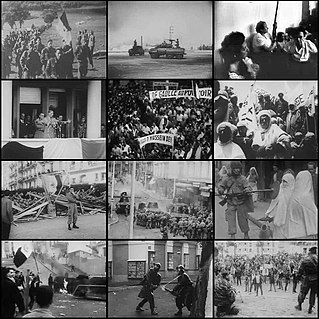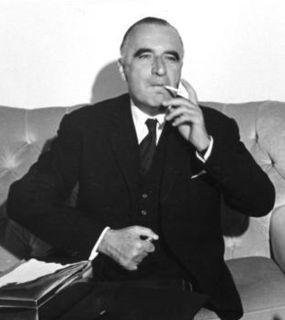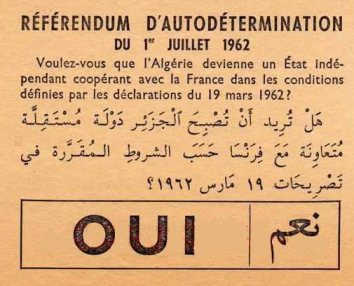Much of the history of Algeria has taken place on the fertile coastal plain of North Africa, which is often called the Maghreb. North Africa served as a transit region for people moving towards Europe or the Middle East, thus, the region's inhabitants have been influenced by populations from other areas, including the Carthaginians, Romans, and Vandals. The region was conquered by the Muslims in the early 8th century AD, but broke off from the Umayyad Caliphate after the Berber Revolt of 740. Later, various Berbers, Arabs, Persian Muslim states, Sunni, Shia or Ibadi communities were established that ruled parts of modern-day of Algeria: including the Rustamids, Ifranids, Fatimids, Maghrawas, Zirids, Hammadids, Almoravid, Almohads, Hafsids, and Ziyyanids. During the Ottoman period, Algiers was the center of the Barbary slave trade which led to many naval conflicts. The last significant events in the country's recent history have been the Algerian War and Algerian Civil War.

The Organisation Armée Secrète or OAS was a short-lived right-wing French dissident paramilitary organization during the Algerian War (1954–62). The OAS carried out terrorist attacks, including bombings and assassinations, in an attempt to prevent Algeria's independence from French colonial rule. Its motto was L’Algérie est française et le restera.

The Algerian War, also known as the Algerian War of Independence or the Algerian Revolution was fought between France and the Algerian National Liberation Front from 1954 to 1962, which led to Algeria gaining its independence from France. An important decolonization war, it was a complex conflict characterized by guerrilla warfare, maquis fighting, and the use of torture. The conflict also became a civil war between the different communities and within the communities. The war took place mainly on the territory of Algeria, with repercussions in metropolitan France.

Ferhat Abbas was an Algerian politician who acted in a provisional capacity as the yet-to-become independent country's President from 1958 to 1961, as well as the first President of the National Assembly and the first acting President after independence. His political views evolved from pro-French collaboration to those of a revolutionary nationalist, over a period of approximately twenty years.

French North Africa was a collection of territories in North Africa controlled by France during the 19th and 20th century colonial era, centering on French Algeria. At its height, it comprised most of the Maghreb.
The Green March was a strategic mass demonstration in November 1975, coordinated by the Moroccan government, to force Spain to hand over the disputed, autonomous semi-metropolitan province of Spanish Sahara to Morocco. The demonstration of some 350,000 Moroccans advanced several kilometres into the Western Sahara territory, escorted by nearly 20,000 Moroccan troops, and meeting very little response by the Sahrawi Polisario Front. Nevertheless, the events quickly escalated into a fully waged war between Morocco and the militias of the Polisario, the Western Sahara War, which would last for 16 years. Morocco later gained control over most of the former Spanish Sahara, which it continues to hold.

The International Court of Justice Advisory Opinion on Western Sahara was a 1975 advisory, non-binding opinion by the International Court of Justice (ICJ) of two questions presented to it by the UN General Assembly under Resolution 3292 regarding the disputed territory of Western Sahara. In 1969, Spain returned the region of Ifni to Morocco.

The Settlement Plan was an agreement between the ethnically Saharawi Polisario Front and Morocco on the organization of a referendum, which would constitute an expression of self-determination for the people of Western Sahara, leading either to full independence, or integration with the Kingdom of Morocco. It resulted in a cease-fire which remains effective to this day, and the establishment of the MINURSO peace force to oversee it and to organize the referendum. The referendum never occurred.
The Oran massacre of 1962 was an internecine slaughter of Pied-Noir and European expatriates living in Algeria. It took place in Oran beginning at Algerian independence date, and ended on July 7, 1962. Estimates of the death toll vary from a low of 95 to a high of 453 disappeared.

French legislative elections took place on 18 November and 25 November 1962 to elect the second National Assembly of the Fifth Republic.

A referendum on self-determination for Algeria was held in France on 8 January 1961. Self-determination was approved by 75.0% of voters overall and 69.5% in Algeria. The government reported voter turnout of 92.2%. Other sources claim that two-fifths of those entitled to vote abstained.

A referendum to approve the Évian Accords ending the Algerian War and granting self-determination to Algeria was held in France on 8 April 1962. It was approved by 90.8% of voters with a 75.3% turnout.
France emerged from World War II in the 1960s, rebuilding the country physically and the nation's national identity through the French Fifth Republic. Under the leadership of President Charles de Gaulle (1959–1969), France regained its great power status.
Events from the year 1962 in France.

Relations between France and Algeria span more than five centuries. This large amount of time has led to many changes within the nation of Algeria; subsequently, affecting the relations enormously. Through this time period, Algeria has gone through being part of the Ottoman Empire, being conquered and colonized by France, playing an important role in both world wars, and finally being its own nation. Over time, relations between the nations have suffered, as tension between Algerians and the French has increased. This being said, however, despite its history, both Algeria and France share a long and historically rich relationship. In 1992, relations between Algeria and France began to strengthen. Today the relationship between French and Algeria is strong. France has an Algerian embassy in Paris, and Algeria has a French embassy in Algiers.

The National Museum of Fine Arts of Algiers is a museum located in Algiers, Algeria. On May 14th, 1962 over 300 works of art were brought to the Louvre in Paris from the Museum.

Independence Day, observed annually on July 5th every year, is a National Holiday in Algeria commemorating Algeria's independence from France on July 5th 1962.















